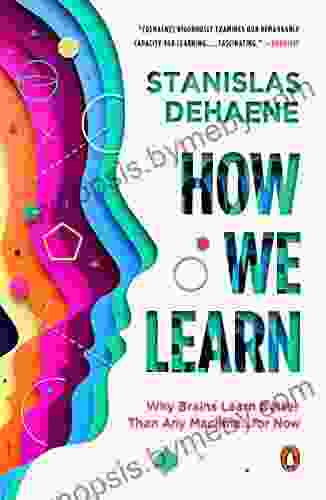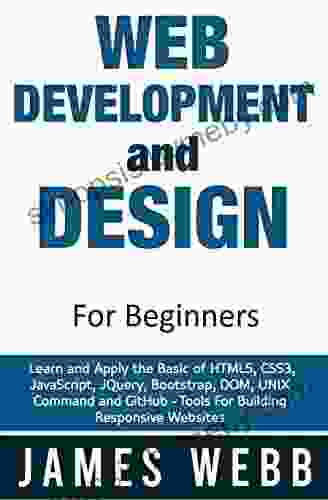Why Brains Learn Better Than Any Machine For Now

4.8 out of 5
| Language | : | English |
| File size | : | 33632 KB |
| Text-to-Speech | : | Enabled |
| Screen Reader | : | Supported |
| Enhanced typesetting | : | Enabled |
| X-Ray | : | Enabled |
| Word Wise | : | Enabled |
| Print length | : | 352 pages |
In the realm of artificial intelligence (AI),machines have made remarkable progress in various domains, including image recognition, natural language processing, and game playing. However, despite these impressive achievements, human brains still possess a distinct advantage over machines when it comes to learning.
This article delves into the reasons why brains learn better than machines, examining the unique capabilities of the human mind and the challenges faced by machine learning algorithms.
The Power of Generalization
One of the key strengths of the human brain is its ability to generalize. This refers to the capacity to learn from a limited set of examples and apply that knowledge to new and unseen situations.
For instance, a child can learn to recognize a cat by observing a few pictures of cats. Once the child has grasped the concept of "cat," they can effortlessly identify cats in different poses, lighting conditions, and even different species.
In contrast, machines often struggle with generalization. They tend to rely heavily on memorization and may fail to perform well when presented with data that differs from the training set.
The Role of Context
Another aspect where brains excel is their ability to process information within a context. Humans can effortlessly draw connections between different pieces of information and understand the broader context.
For example, when reading a sentence, we can infer the meaning of ambiguous words based on the surrounding text. We can also make inferences and draw s based on our prior knowledge and experiences.
Machines, on the other hand, typically lack this contextual understanding. They may process information in isolation and fail to capture the nuances and relationships that are crucial for deeper learning.
The Importance of Creativity
One of the most remarkable abilities of the human brain is its capacity for creativity. We can generate novel ideas, solve problems in unconventional ways, and create works of art.
This creativity is essential for progress and innovation. It allows us to adapt to changing environments, overcome obstacles, and push the boundaries of human knowledge.
Machines, while capable of performing certain creative tasks, still fall short of the human brain's ability to generate truly original and insightful ideas.
The Challenges of Machine Learning
Despite the rapid advancements in machine learning, there are still significant challenges that limit the learning capabilities of machines.
One major challenge is the need for large amounts of labeled data. Machine learning algorithms require vast datasets to learn effectively. This can be a costly and time-consuming process, especially for complex tasks.
Another challenge is the interpretability of machine learning models. It can be difficult to understand how and why machines make certain decisions, making it challenging to debug and improve their performance.
The Future of Human-Machine Collaboration
While brains currently surpass machines in many aspects of learning, it is important to recognize the potential benefits of human-machine collaboration.
By combining the strengths of human creativity, intuition, and flexibility with the efficiency and precision of machines, we can create powerful hybrid systems that can tackle complex problems that neither humans nor machines can solve alone.
The human brain is a marvel of nature, capable of learning, adapting, and creating in ways that far surpass any machine currently in existence.
While machines are making rapid progress in the field of AI, it is unlikely that they will fully match the learning capabilities of the human brain in the foreseeable future.
By understanding the strengths and limitations of both brains and machines, we can harness their combined potential to create a future where humans and machines work together to solve the greatest challenges of our time.
4.8 out of 5
| Language | : | English |
| File size | : | 33632 KB |
| Text-to-Speech | : | Enabled |
| Screen Reader | : | Supported |
| Enhanced typesetting | : | Enabled |
| X-Ray | : | Enabled |
| Word Wise | : | Enabled |
| Print length | : | 352 pages |
Do you want to contribute by writing guest posts on this blog?
Please contact us and send us a resume of previous articles that you have written.
 Book
Book Novel
Novel Page
Page Chapter
Chapter Text
Text Story
Story Genre
Genre Reader
Reader Library
Library Paperback
Paperback E-book
E-book Magazine
Magazine Newspaper
Newspaper Paragraph
Paragraph Sentence
Sentence Bookmark
Bookmark Shelf
Shelf Glossary
Glossary Bibliography
Bibliography Foreword
Foreword Preface
Preface Synopsis
Synopsis Annotation
Annotation Footnote
Footnote Manuscript
Manuscript Scroll
Scroll Codex
Codex Tome
Tome Bestseller
Bestseller Classics
Classics Library card
Library card Narrative
Narrative Biography
Biography Autobiography
Autobiography Memoir
Memoir Reference
Reference Encyclopedia
Encyclopedia Dorthe Berntsen
Dorthe Berntsen Simon Dewhurst
Simon Dewhurst Drayton Bird
Drayton Bird Doug Cook
Doug Cook Brian Zepka
Brian Zepka Dreamstorm Publications
Dreamstorm Publications Marty Neumeier
Marty Neumeier Doug Wilson
Doug Wilson Mary Kay Cunningham
Mary Kay Cunningham Dr Aviva Legatt
Dr Aviva Legatt Garrison Keillor
Garrison Keillor Douglas Riley
Douglas Riley Dustin Hansen
Dustin Hansen Dylan Norton
Dylan Norton Edward Beauclerk Maurice
Edward Beauclerk Maurice Dorie Clark
Dorie Clark Lesley Pyne
Lesley Pyne Gou Tanabe
Gou Tanabe Dzung Lewis
Dzung Lewis Graydon R Hilyard
Graydon R Hilyard
Light bulbAdvertise smarter! Our strategic ad space ensures maximum exposure. Reserve your spot today!

 Christian BarnesArthur Woody and the Legend of the Barefoot Ranger: An Enchanting Journey of...
Christian BarnesArthur Woody and the Legend of the Barefoot Ranger: An Enchanting Journey of...
 Randy HayesDeep Woods Wild Waters: A Journey of Resilience and Redemption in the Untamed...
Randy HayesDeep Woods Wild Waters: A Journey of Resilience and Redemption in the Untamed... Pablo NerudaFollow ·8.7k
Pablo NerudaFollow ·8.7k Miguel de CervantesFollow ·17.9k
Miguel de CervantesFollow ·17.9k Jorge AmadoFollow ·9.2k
Jorge AmadoFollow ·9.2k Calvin FisherFollow ·17.6k
Calvin FisherFollow ·17.6k Roberto BolañoFollow ·6.2k
Roberto BolañoFollow ·6.2k Devin CoxFollow ·6.1k
Devin CoxFollow ·6.1k Eric NelsonFollow ·2.1k
Eric NelsonFollow ·2.1k Alex FosterFollow ·4.7k
Alex FosterFollow ·4.7k

 Colton Carter
Colton CarterEmperor of the Sea Charlotte Linlin:
A Monumental Force...

 Brett Simmons
Brett SimmonsIgnite Intimacy and Bridge Miles: 401 Discussion...
Long distance relationships (LDRs),while...

 Manuel Butler
Manuel ButlerEscape into the Extraordinary World of "Dressrosa:...
Unveiling the...

 Stuart Blair
Stuart BlairUnlock the Secrets to Enhance Your Fertile Egg Quality: A...
For couples longing to start...

 Ismael Hayes
Ismael HayesOperation Dressrosa: The One Piece Graphic Novel – Gear...
Are you ready to set sail on...
4.8 out of 5
| Language | : | English |
| File size | : | 33632 KB |
| Text-to-Speech | : | Enabled |
| Screen Reader | : | Supported |
| Enhanced typesetting | : | Enabled |
| X-Ray | : | Enabled |
| Word Wise | : | Enabled |
| Print length | : | 352 pages |










